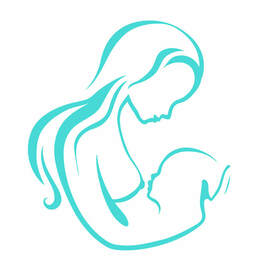Some people like to breastfeed and then there are others who don’t. This is a personal decision and whether you go with breastfeeding, formula feeding or supplementing, please know there is nothing wrong with any way you feed your baby.
Breastfeeding Facts

It has been scientifically proven that breastfeeding is healthier for your baby. Below are some benefits:
For Baby
For Moms
The American Academy of Pediatrics recommends that babies should be exclusively breastfeed (no formula, juice or water) for the first 6 months.
Honestly, I believe exclusively breastfeeding for the first 6 months is hard for most moms because a majority of women have issues producing enough milk (in these cases PLEASE supplement with formula).
For Baby
- Ideal amount of nutrition (vitamins, protein, and fat)
- Decreases SIDS
- Helps fight off viruses and bacteria
- Protects against allergies
- Reduces ear infections
- Decreases obesity later in childhood
For Moms
- Aids with weight loss and helps uterus to return to pre-pregnancy size
- Decreases risk of osteoporosis later in life
- Reduces risk of breast, uterine, endometrial and ovarian cancer
- Decreases insulin used in diabetic breastfeeding moms
The American Academy of Pediatrics recommends that babies should be exclusively breastfeed (no formula, juice or water) for the first 6 months.
Honestly, I believe exclusively breastfeeding for the first 6 months is hard for most moms because a majority of women have issues producing enough milk (in these cases PLEASE supplement with formula).
Breastfeeding 101
The first few days of breastfeeding may be difficult. It's going to be a learning curve for you and your baby.
During the first 24-48 hours your body will be producing colostrum. Colostrum (often called liquid gold) is full of benefits for your newborn baby. It can be yellow to clear in color and it is easily digested in your baby's system. Colostrum helps with loosening mucus in your baby and as a laxative to clear the baby's intestinal tract.
Within 48-72 hours your body will be transitioning from producing colostrum to mature milk. Regular feedings will help the milk come quicker and helps ensure your baby is getting his/her nutritional needs. Milk production is regulated by supply and demand. The more milk that is removed, the more the breasts are stimulated to produce more.
During the first 24-48 hours your body will be producing colostrum. Colostrum (often called liquid gold) is full of benefits for your newborn baby. It can be yellow to clear in color and it is easily digested in your baby's system. Colostrum helps with loosening mucus in your baby and as a laxative to clear the baby's intestinal tract.
Within 48-72 hours your body will be transitioning from producing colostrum to mature milk. Regular feedings will help the milk come quicker and helps ensure your baby is getting his/her nutritional needs. Milk production is regulated by supply and demand. The more milk that is removed, the more the breasts are stimulated to produce more.
Starting to Breastfeed
Before each feeding review the 3C's:
Calm: make sure that both you and your baby are calm, holding your baby skin-to-skin is very helpful to get him/her calm.
Comfort: make sure that both you and your baby are in a comfortable position. Have pillows around you or sit in a comfortable chair to help support your back and legs. Try different positions for your baby and see which one works best for the both of you.
Close: hold and position your baby close to you. Having a proper position and latch-on are the keys to a successful breastfeed.
Calm: make sure that both you and your baby are calm, holding your baby skin-to-skin is very helpful to get him/her calm.
Comfort: make sure that both you and your baby are in a comfortable position. Have pillows around you or sit in a comfortable chair to help support your back and legs. Try different positions for your baby and see which one works best for the both of you.
Close: hold and position your baby close to you. Having a proper position and latch-on are the keys to a successful breastfeed.
Making Sure Your Baby Receives the Right Amount of Food
Most babies will be fed every 3 hours for the first 3-4 months (about 8-12 feedings in a 24 hr window). In the first few days you may have to wake your baby to feed, because your baby is going to be tired. Watch for feeding cues. Your baby will also cluster feed when he/she is going through a growth spurt, so don’t be alarmed if you feel that your baby is always hungry - he/she might be going through a growth spurt. Your baby will let you know when he/she is full (your baby will self-detach, become sleepy and your baby's body will be relaxed).
Another way to make sure your baby is receiving the correct amount of food is to watch how many diapers he/she has gone through.
During the first couple of days your baby will pass meconium (black sticky substance from your baby's bowels). Then 3-4 stools (yellow mustard color, runny and seeding in texture) for the first month.
Weight gain is another way to tell if your baby is getting enough food. Expect your baby to lose a few ounces after birth. By day 10 your baby should be back to his/her original weight (expect 4-7 oz of weight gain per week once milk has come in).
Another way to make sure your baby is receiving the correct amount of food is to watch how many diapers he/she has gone through.
- 1 wet diaper in the first 24 hours
- 2 wet diapers on the second day
- 3 wet diapers on the third day
- 6 to 8 wet diapers of urine that are light yellow once milk is in greater supply
During the first couple of days your baby will pass meconium (black sticky substance from your baby's bowels). Then 3-4 stools (yellow mustard color, runny and seeding in texture) for the first month.
Weight gain is another way to tell if your baby is getting enough food. Expect your baby to lose a few ounces after birth. By day 10 your baby should be back to his/her original weight (expect 4-7 oz of weight gain per week once milk has come in).
Dietary Requirements for Mom
While breastfeeding your dietary requirements are similar to when you were pregnant. Keep a well balanced diet while breastfeeding. Some women experience that certain foods they eat will affect their baby's behavior (irritable, gassy, colic). If you think certain foods are causing issues, avoid it and watch your baby's response. A nursing mom should also be drinking about 10 glasses of fluid a day - this will help with milk production.




